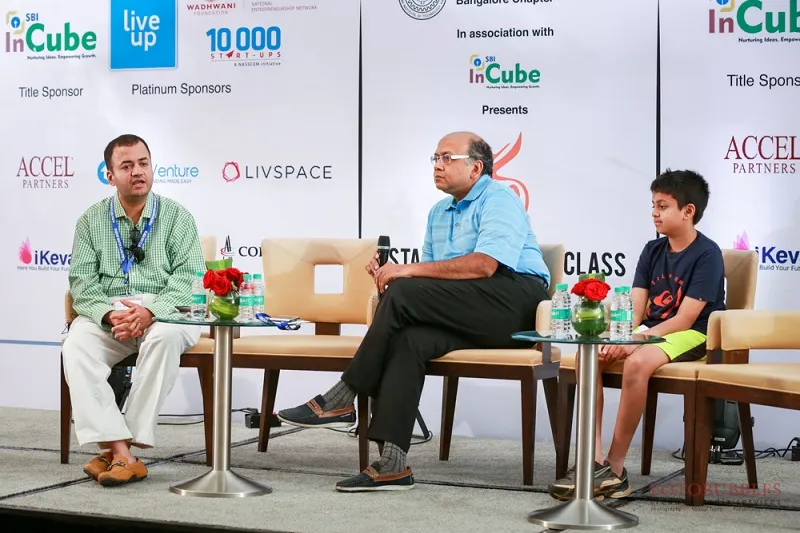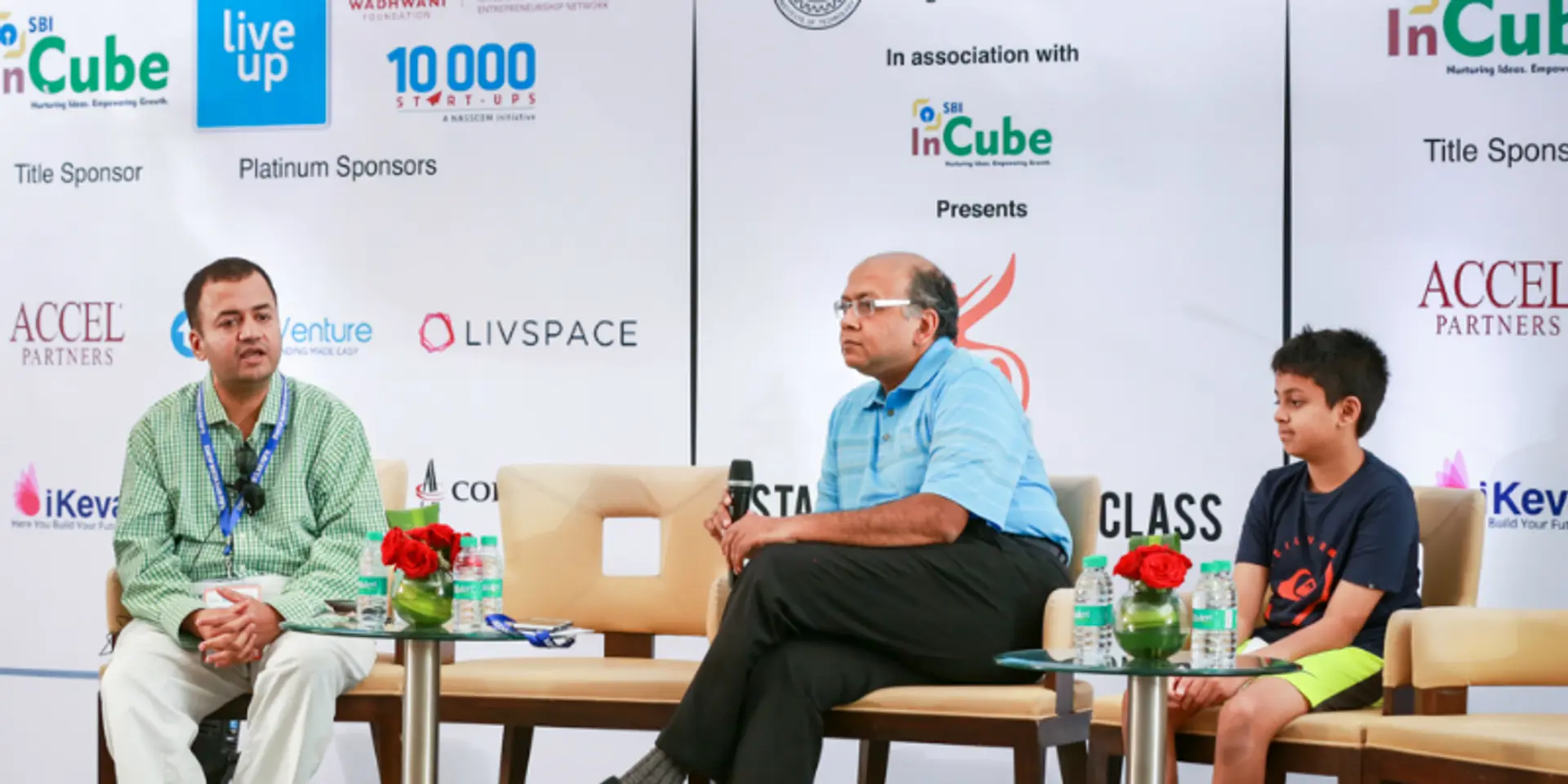How to build a profitable Unicorn, in the words of Dhiraj Rajaram and Subrata Mitra
Dhiraj Rajaram, Founder and chairman of Mu Sigma, and Subrata Mitra, Partner at Accel Partners, had a candid discussion recently at StartupMaster Class, an event hosted by IIT Kanpur Alumni Association in Bengaluru. They discussed the evolution of entrepreneurship over the past decade, the dilemmas startup founders generally face, Indian jugaad, investor-VC conflict of interests and profitability and scale. Here are some highlights from their discussion:

Image credit: Foto Bubbles
Entrepreneurship then and now
Dhiraj and Subrata reflected on the long journey that they had gone through over the last few years and how the startup scene in India has changed drastically over the past decade.
The only reason Dhiraj chose to start up was because he believed there was big pain point to be solved. Subrata pointed out to the audience that Dhiraj had enough belief in his idea, that he and his wife sold their Chicago home to finance the company in its early days. With startups gaining mainstream popularity now, Dhiraj said, “These days I get scared when everyone says that they want to become entrepreneurs.”
Dhiraj believed that people should start companies when they have real problems to solve and not because it is the current fad. He added that though India needs more people in the entrepreneurial ecosystem it doesn’t necessarily need more entrepreneurs. He said,
We need more employees with entrepreneurial spirit and they should be encouraged to be a key part of startups. If an entrepreneur needs encouragement then he or she is not a true entrepreneur.
Subrata and Dhiraj also stressed on the importance of early hires and the initial core team that make a big difference for upcoming startups. Dhiraj said, “Subrata helped me hire my first 10 employees through his personal network and alma mater (IIT Kanpur) and this helped Mu Sigma immensely.”
Starting up
Dhiraj was initially working as a Management Consultant with Booz Allen Hamilton, before going on to start Mu Sigma. About starting up, he said,
“ I never wanted to be an entrepreneur.”
Subrata in jest added, “I never wanted to become a VC."
While working, Dhiraj realised that the problem-solving paradigm in system integrations and IT was getting slower and less agile. He said, “We saw that problem-solving needed an overhaul and wanted to bring maths, business and technology together to solve this pain point.”
They realised that there was limited supply of applied mathematicians in the world and finding people with expertise in applied maths, business and programming was not an easy task. So they built the company step-by-step and Dhiraj felt that even after over a decade in the industry, they are still in their adolescence stages.
‘I hid my real dreams from early customers and investors’
While talking about the early days at Mu Sigma, Dhiraj added that he initially hid his full vision for the company from his customers and even early investors. He said, “I thought that everyone would think I was dreaming and wouldn’t believe a word of it.”
Subrata interjected reassuringly that this was fairly standard behaviour among ambitious entrepreneurs.
Talking about their core business and strategy, Dhiraj said that their aim was to build an art of problem solving that was scalable and not limited to specific problems. He believes that this was the USP that helped them survive and thrive while competitors stumbled or shut shop. He said, “Most of the other companies thought of it as solving specific problems and that made the difference finally. We invested in training, platforms and everything we deemed necessary to improve our ‘art of problem solving’ methodology.”
Indian jugaad and innovation
When Subrata broached the topic of jugaad and innovation, Dhiraj stated, “Jugaad is not about taking shortcuts. It is about not giving up under resource-constrained environments.”
Dhiraj then cited an example of how Mu Sigma showcased their jugaad to one of their major clients -Walmart. He said, “As part of their company culture Walmart looks to make judicious use of resources. So when we wanted to get new furniture for our office, we went to a trailer park in Bentonville, Arkansas, where Walmart’s trucks are dismantled, and used the recovered wood to make our office benches. This turned out to be cost effective for us and also showed Walmart that our relationship with them was not limited to monetary transactions.”
Message to young entrepreneurs
Dhiraj believed that real entrepreneurs shouldn’t hesitate to put their skin in the game. Many entrepreneurs generally have second thoughts when the going gets tough and consider moving back to a 9-to-5 job. Dhiraj said,
The best way to overcome those thoughts is to burn your existing bridges, so that there is no looking back.
Dhiraj stressed that entrepreneurs should look at beating the system when they can. He said, “Be in the mode of ‘why not’? If the system says something should cost five dollars, try and figure out a way to get it done for three dollars.”
Regarding the stigma that has long been attached with starting up in India, Dhiraj believed that there is nothing wrong in being considered poor by one’s peer group and sacrificing luxuries to build a business. He said, “What is wrong is people being non-authentic. What you are willing to give up is what defines you and makes you successful. Be true to your employees and people who are around you. People will eulogise you for toughing it and taking responsibility.”
Take unreasonable risks
Subrata said that entrepreneurs should ensure that their vision carries through to the next five or seven people in their company who will become their ‘soulmates’ for the their long journey. “Ensure there are proper communication channels. Talk regularly and build trust,” he added.
On taking risks, Dhiraj said that relying on instincts and gut-feel is better than relying on the brain, in most cases. He added, “While looking for a spouse, people rely on their heart and feelings rather than the brain. Good VCs too invest in people (not purely in the business) and they know misfits generally turn out to be great entrepreneurs.”
Profitability or scale or both?
India is currently home to 5.7 per cent of the world's unicorns, with nine of India’s mature startups being valued more than $1 billion (Mu Sigma being one of them). Subrata asked Dhiraj about what it takes to build a unicorn in India. He asked,
Should startups focus on profitability or scale or both?
Dhiraj admitted that this was a hard question and varied across organisations and the entrepreneur’s ultimate objectives. If the focus is on scaling rapidly, then the founding team should be prepared to do away with a large amount of their equity to raise huge funding rounds,while on the other hand if founders are in it for the long haul they should focus on unit economics from day one and give up small amounts of equity only when necessary.
According to Dhiraj, safeguarding the startup is the founding team's fiduciary duty. He said, “You should try to develop a company that can generate its own cash rather than diluting your equity to raise capital. After all, the main aspect of being an entrepreneur is owning your company, otherwise you are more like a glorified employee. So create cash flow and profits as quickly as possible.”
Having worked with and invested in many well-known entrepreneurs, Subrata too weighed in on the subject to say,
There is no right answer to this dilemma. Entrepreneurs should do what their heart tells them to do and not have regrets later.
While Subrata believed that India is not in a downturn, but due to the excesses of 2015, there will be market corrections. But this should not worry entrepreneurs. He said, “Google was built in a downturn. Lot of investments are happening in India but on a smaller scale. Fundamentally, Indian consumption is going to grow five to tenfold in next ten-year period and India-facing companies will start doing well.”
Conflict of interest between entrepreneurs and VCs
VCs generally want to multiply their money or look for exits as soon as possible for their firm, while passionate entrepreneurs want to solve problems, irrespective of how much time it could take. On this possible conflict of interest, Dhiraj said,
The relationship between a VC and entrepreneur is similar to Mother-in-law and daughter-in-law. It is not possible for both parties to be aligned all the time and they need not be aligned either.
Dhiraj believes that the relationship creates ‘good tension’ and discipline that is beneficial for the company in the long run. He also added the end-game involves entrepreneurs pushing VCs out or VCs pushing entrepreneurs out.
Dhiraj concluded that entrepreneurs should just focus on their work and social good and impact will follow automatically.
Related reads: Unicorns are a myth. But you do believe!
Of unicorns, billion-dollar valuations, successful exits and inspirations



